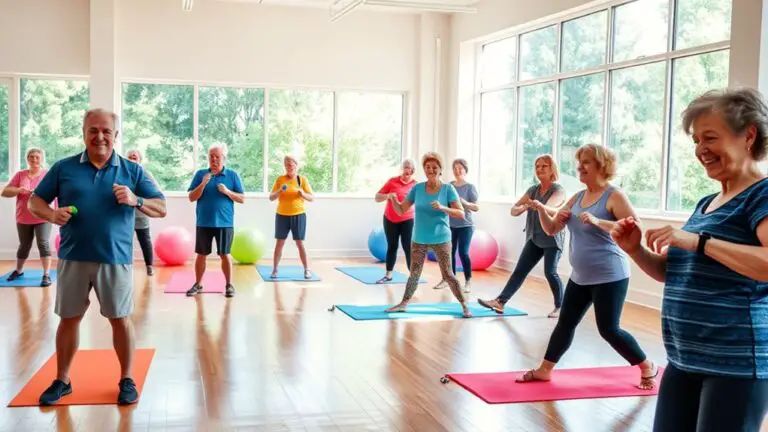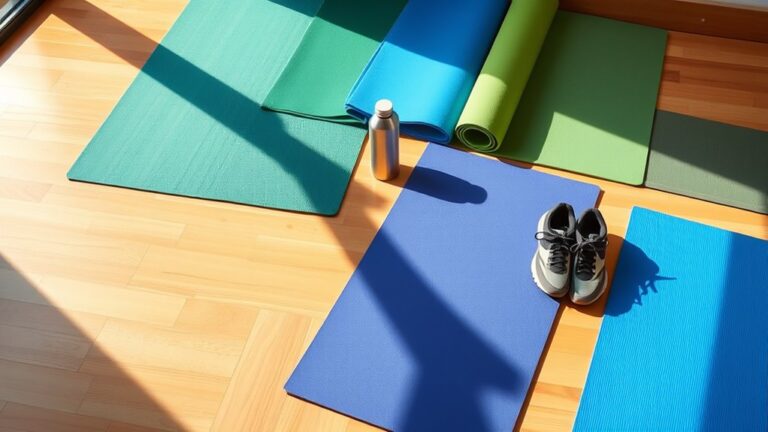The Connection Between Gym Workouts and Better Sleep
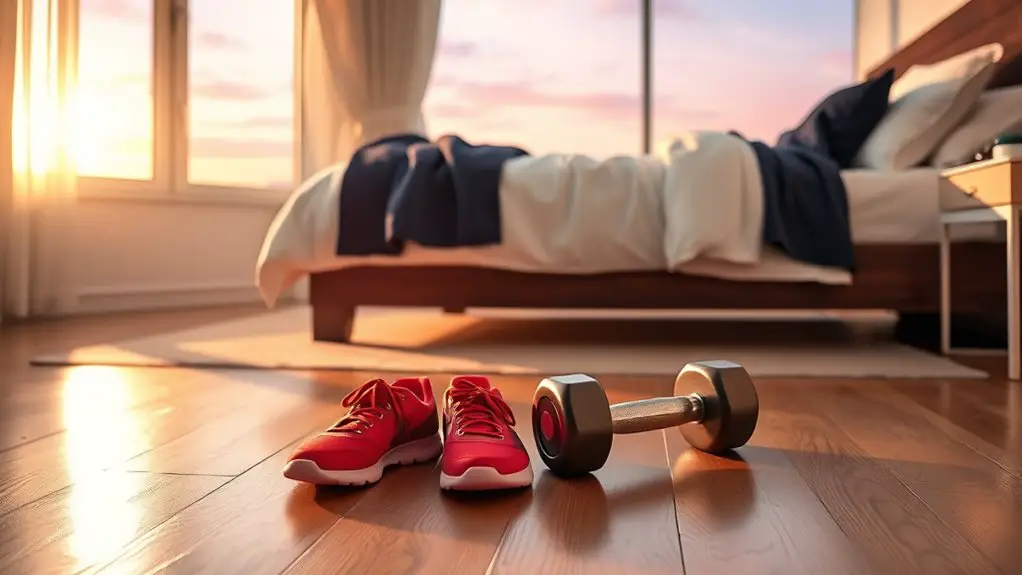
Gym workouts can greatly improve your sleep quality. Regular exercise helps regulate your sleep cycles and reduces stress, making it easier to get deeper rest. Cardio workouts elevate your heart rate and boost endorphins, while strength training promotes restorative sleep through recovery. Timing your workouts right can also enhance your sleep benefits. If you want to discover more ways to optimize your sleep through exercise, there’s plenty more to explore!
The Science Behind Exercise and Sleep
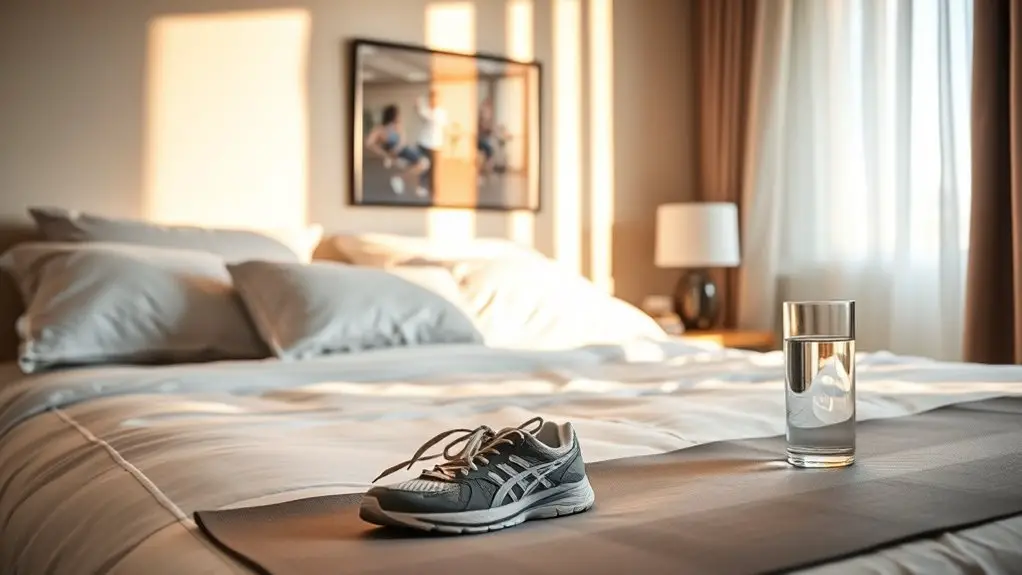
When you think about the benefits of exercise, better sleep might not be the first thing that comes to mind. However, the science behind exercise and sleep is fascinating. Exercise physiology shows that physical activity helps regulate your sleep cycles, promoting deeper and more restorative sleep. When you work out, your body temperature rises, and as it cools down post-exercise, it signals to your brain that it’s time to sleep.
Moreover, regular workouts can reduce anxiety and stress levels, which are often barriers to a good night’s rest. You’ll likely find that the more consistent you are with your exercise routine, the better your sleep quality becomes. So, if you’re struggling to catch those Zs, consider hitting the gym. Not only will you feel more energized, but you’ll also set the stage for a restful night, enhancing your overall well-being.
How Different Types of Workouts Affect Sleep Quality
While all workouts can contribute to better sleep, the type of exercise you choose can considerably influence how well you rest at night. Cardio workouts, like running or cycling, have fantastic cardio benefits that elevate your heart rate and release endorphins, leading to improved mood and relaxation. These exercises can help you fall asleep faster and enjoy deeper sleep cycles.
On the other hand, strength training focuses on building muscle and enhancing overall strength. This type of workout promotes the release of growth hormones, which aid in recovery and can lead to more restorative sleep. Plus, the sense of accomplishment you gain from lifting weights can boost your confidence, making it easier to unwind at night.
Ultimately, incorporating both cardio and strength training into your routine can optimize your sleep quality, making you feel more energized and refreshed each morning. So, get moving and watch your sleep improve!
Timing Your Workouts for Optimal Sleep Benefits

To maximize the benefits of your workouts on sleep, it’s essential to reflect on not just what you do, but when you do it. Morning workouts can kickstart your day, boosting energy levels and setting a positive tone. Exercising early can help regulate your circadian rhythm, making it easier to fall asleep at night. Plus, you’ll likely feel accomplished, reducing stress throughout your day.
On the other hand, evening exercises have their perks too. If you’re not a morning person, working out later can serve as a great way to decompress after a long day. Just be mindful of intensity; high-energy sessions too close to bedtime might leave you wired instead of relaxed.
Ultimately, it’s about finding what fits your lifestyle. Experiment with morning workouts and evening exercises to see which helps you sleep better, ensuring you wake up refreshed and ready to seize the day!
The Role of Stress Reduction in Sleep Improvement
Stress can greatly impact your ability to get a good night’s sleep, so finding effective ways to reduce it is vital. Exercise plays a significant role in stress reduction, enhancing your mental health and overall well-being. Incorporating relaxation techniques like deep breathing, meditation, or yoga can further amplify your results, leading to more restful nights.
Here’s a quick overview of effective stress-reduction practices:
| Technique | Benefits | Implementation |
|---|---|---|
| Deep Breathing | Lowers heart rate | Practice for 5-10 mins |
| Meditation | Enhances focus and clarity | Start with guided sessions |
| Yoga | Improves flexibility and calm | Join a class or follow online |
| Progressive Relaxation | Reduces muscle tension | Try before bedtime |
| Journaling | Clears the mind | Write for 10 mins nightly |
Tips for Incorporating Exercise Into Your Daily Routine
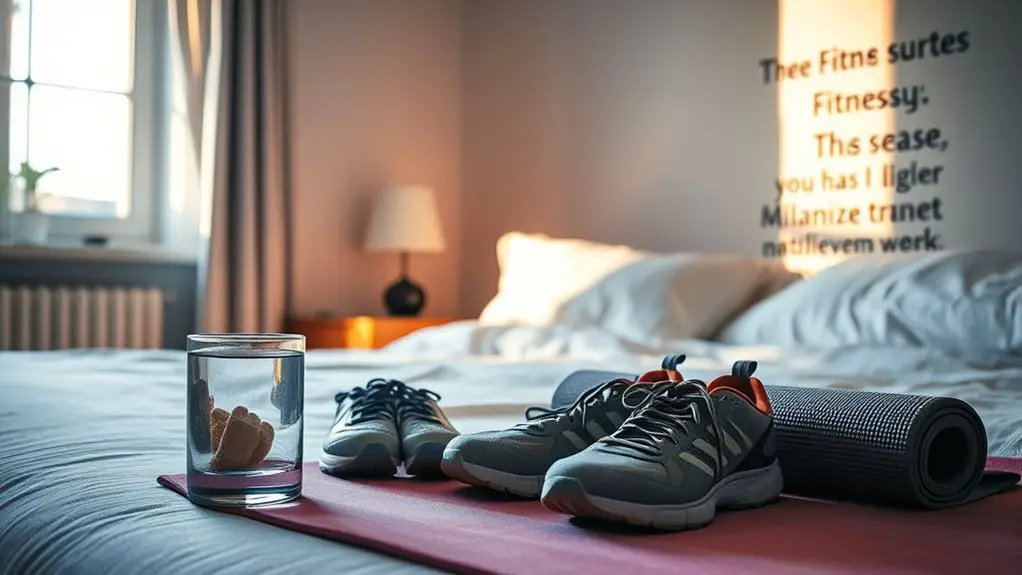
Finding ways to manage stress can set the stage for better sleep, but incorporating exercise into your daily routine is just as important for overall health. Start by integrating short workouts into your morning routines; even a brisk walk or quick bodyweight exercises can energize you for the day ahead. If mornings aren’t your thing, consider scheduling a lunchtime workout to break up your day and keep stress levels in check.
In the evenings, don’t overlook the power of evening stretches. They can help you wind down, releasing tension built up throughout the day and preparing your body for restful sleep. Aim for a few minutes of yoga or gentle stretches before bed. Additionally, engaging in regular full-body workouts like skipping rope can enhance your overall physical fitness and contribute to better sleep quality. Remember, it’s all about consistency. Find what works for you, and soon exercising will feel like a natural part of your day, promoting not only better sleep but a healthier, happier you.
Frequently Asked Questions
Can Exercise Replace Sleep Medication for Insomnia?
Exercise can be a powerful alternative to sleep medication for insomnia. Regular physical activity not only improves your mood but also enhances sleep quality. Exploring these exercise alternatives might just be the insomnia solution you need!
How Long Before Bedtime Should I Stop Exercising?
Think of your body as a car; if you rev it too close to bedtime, it won’t cool down. Aim to finish evening workouts at least two hours before your bedtime routine for ideal relaxation.
Does Exercise Intensity Affect Sleep Differently?
Yes, exercise intensity can affect sleep differently. High intensity workouts might energize you, making it harder to wind down, while moderate intensity exercise often promotes relaxation and enhances sleep quality. Finding your balance is key!
Is There a Specific Type of Exercise That Promotes Deeper Sleep?
Incorporating yoga benefits and aerobic activities into your routine can promote deeper sleep. Both types of exercise help reduce stress and enhance relaxation, making it easier for you to drift off into a restful slumber.
Can Too Much Exercise Negatively Impact Sleep Quality?
You’d think working out non-stop would guarantee perfect sleep, right? Ironically, overtraining can elevate cortisol levels, disrupting your rest. Balance’s key—listen to your body, and don’t let ambition sabotage your sleep quality.
